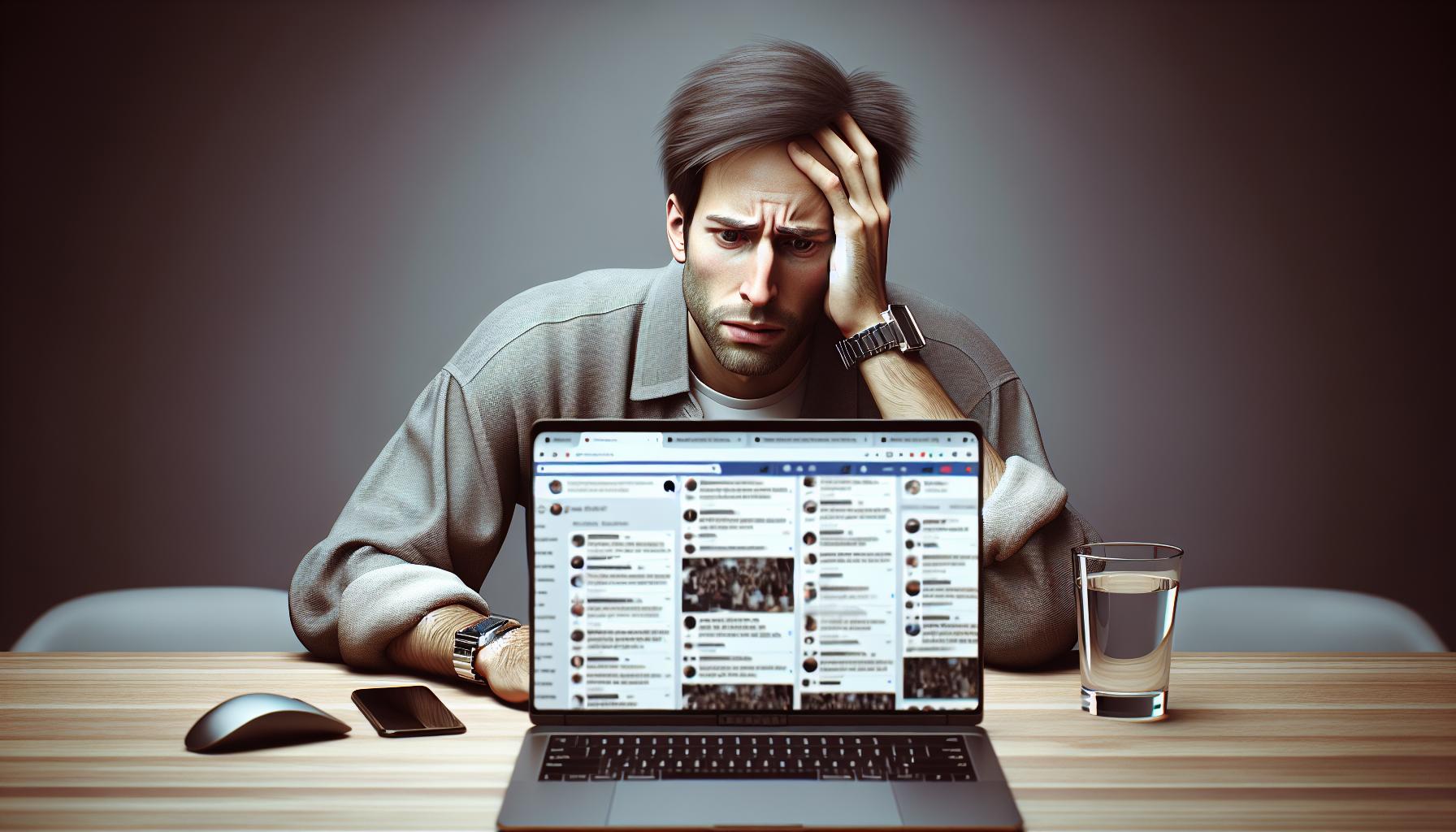Key Takeaways
- Understanding the Risks: Social media offers connectivity but comes with significant dangers that include cyberbullying, misinformation, and privacy concerns, which can impact mental health and personal safety.
- Mental Health Impact: Increased social media usage correlates with heightened anxiety and depression, particularly among adolescents, who may also develop body image issues due to exposure to unrealistic beauty standards.
- Privacy and Security: Users are vulnerable to data breaches and identity theft on social media. Strengthening passwords and limiting personal information can help mitigate these risks.
- Misinformation Spread: Social media is a breeding ground for false information, which can lead to confusion and public distrust. Understanding the role of algorithms in spreading misinformation is crucial for users.
- Addiction Awareness: Social media addiction can negatively affect productivity, relationships, and mental health. Recognizing the signs and adjusting usage habits is essential for a balanced online life.
Social media has transformed how people connect and communicate, offering countless opportunities for interaction. However, beneath the surface of likes and shares lies a darker reality. Users often overlook the potential dangers that come with their online presence, exposing them to various risks that can impact their mental health, privacy, and safety.
From cyberbullying to misinformation, the threats are real and pervasive. As individuals increasingly rely on these platforms for social engagement, understanding the risks becomes crucial. This article explores the significant dangers of social media, shedding light on issues that everyone should be aware of to navigate the digital landscape safely.
List of Dangers of Social Media
Social media serves as a vital platform for communication and connection, influencing how individuals share information and interact. It offers tools for engagement, community building, and content dissemination. Users frequently express thoughts and opinions through posts, comments, and shares, creating an environment that fosters connectivity.
While social media cultivates relationships, it also exposes users to several dangers. Cyberbullying remains prevalent, impacting mental well-being and self-esteem, particularly among adolescents. Misinformation spreads rapidly, leading to confusion and misguided beliefs. Privacy concerns arise as users share personal information, making them vulnerable to data breaches and identity theft.
Social media can distort reality, affecting users’ perceptions of themselves and others. Constant comparisons may lead to feelings of inadequacy, anxiety, and depression. Users often grapple with internet addiction, resulting in reduced productivity and strained personal relationships. Recognizing these risks helps individuals navigate social media landscapes more safely and consciously.
Impact on Mental Health

Social media significantly influences mental health, presenting various dangers that individuals must recognize. The constant exposure to curated content leads to mental health challenges, particularly among youth.
Anxiety and Depression
Anxiety and depression rates increase with social media usage. Research shows that individuals who spend more than three hours daily on these platforms experience heightened symptoms. Online interactions can lead to feelings of isolation and rejection, especially during instances of cyberbullying. A study by the American Journal of Preventive Medicine found a direct correlation between heavy social media use and increased levels of anxiety and depressive symptoms. Users often feel pressure to maintain an idealized online persona, leading to stress and emotional fatigue.
Body Image Issues
Body image issues persist as a prominent danger of social media. Users frequently encounter unrealistic beauty standards propagated by influencers and celebrities. Research from the Journal of Eating Disorders indicates that frequent exposure to altered images can lead to body dissatisfaction in over 60% of young women. As users compare themselves to these images, they may develop negative self-perceptions and harmful behaviors. This cycle contributes to disordered eating and low self-esteem among adolescents and adults alike.
Privacy and Security Risks

Social media presents numerous privacy and security risks, which can endanger personal information and overall well-being. Awareness of these risks helps users make informed decisions regarding their online behavior.
Data Breaches
Data breaches often expose user information to malicious actors. In 2021, over 1.1 billion records were compromised across various platforms due to insufficient security measures. Hackers target social media accounts to obtain sensitive data, leading to identity theft and financial loss. Users should strengthen passwords, enable two-factor authentication, and limit personal data shared on profiles to mitigate risks.
Cyberbullying
Cyberbullying poses significant threats, particularly to adolescents. Approximately 37% of young people experience cyberbullying, which can lead to severe emotional consequences. Unlike traditional bullying, cyberbullying occurs 24/7, increasing feelings of isolation and anxiety. Victims may develop lasting mental health issues, manifesting as depression or lowered self-esteem. Encouraging open dialogue and reporting tools can provide crucial support for those affected.
Misinformation and Fake News

Misinformation and fake news represent significant dangers associated with social media use. The rapid dissemination of false information can lead to confusion, panic, and mistrust within communities.
Consequences of Misinformation
Consequences of misinformation manifest across various sectors, including public health, politics, and social discourse. Misinformation can influence health behaviors, with false information about vaccines correlating to lower vaccination rates, thereby endangering public health. Political misinformation skews perceptions, impacting electoral outcomes, as seen during the 2016 U.S. presidential election, where 62% of American adults reported encountering false information. Social effects include fostering division and distrust among communities, as individuals turn to biased sources that reinforce existing beliefs, creating echo chambers. Such environments can lead to heightened polarization, less civic engagement, and a fragmented society.
The Role of Algorithms
The role of algorithms in propagating misinformation cannot be understated. Algorithms prioritize content based on engagement metrics, often amplifying sensational or misleading information over fact-checked news. This prioritization results in misinformation reaching larger audiences quickly, with studies indicating that false news spreads six times faster than true news on social media platforms. Algorithms also trap users in feedback loops, continually exposing them to similar misleading content. As social media companies focus on user retention, the propagation of misinformation remains a critical issue requiring urgent attention.
Addiction and Overuse
Addiction and overuse of social media pose significant risks to individuals’ mental and physical well-being. Recognizing the signs of social media addiction and understanding its effects on daily life becomes essential to mitigating these dangers.
Signs of Social Media Addiction
Individuals may exhibit several signs of social media addiction, including:
- Compulsive use: Users find themselves constantly checking platforms, even during inappropriate times or in settings requiring attention.
- Neglecting responsibilities: Daily tasks, work obligations, and personal relationships often suffer as excessive time is devoted to online activities.
- Withdrawal symptoms: Symptoms such as anxiety, irritability, or boredom arise when access to social media is restricted.
- Escalation of use: Users increase their time spent online despite recognizing the negative impact on their health and relationships.
- Loss of interest: Previous hobbies and activities become less enjoyable, with social media taking precedence over real-life experiences.
Effects on Daily Life
The effects of social media addiction on daily life can be profound:
- Reduced productivity: Users struggle to focus on work or academic tasks, often leading to missed deadlines and poor performance.
- Strained relationships: Personal interactions may suffer as virtual communication replaces face-to-face interactions, leading to feelings of disconnection.
- Altered sleep patterns: Excessive screen time disrupts sleep routines, particularly when devices are used before bedtime, contributing to fatigue and mood instability.
- Mental health issues: Anxiety, depression, and feelings of inadequacy often increase as individuals compare themselves to the curated lives of others online.
- Physical health concerns: Sedentary behavior associated with prolonged social media use can lead to weight gain, posture problems, and other health-related issues.
Recognizing these signs and effects is crucial for individuals to address their social media usage and create a healthier relationship with these platforms.
Dangers of Social Media
Understanding the dangers of social media is crucial in today’s digital age. Users must remain vigilant about the risks that come with online interactions. From cyberbullying to misinformation and privacy concerns, the potential for harm is significant.
Recognizing the signs of addiction and the impact on mental health is equally important. By being aware of these challenges, individuals can take proactive steps to protect themselves. This awareness fosters a healthier relationship with social media and promotes safer online experiences. Ultimately, navigating social media thoughtfully can lead to more positive outcomes in both personal and community contexts.